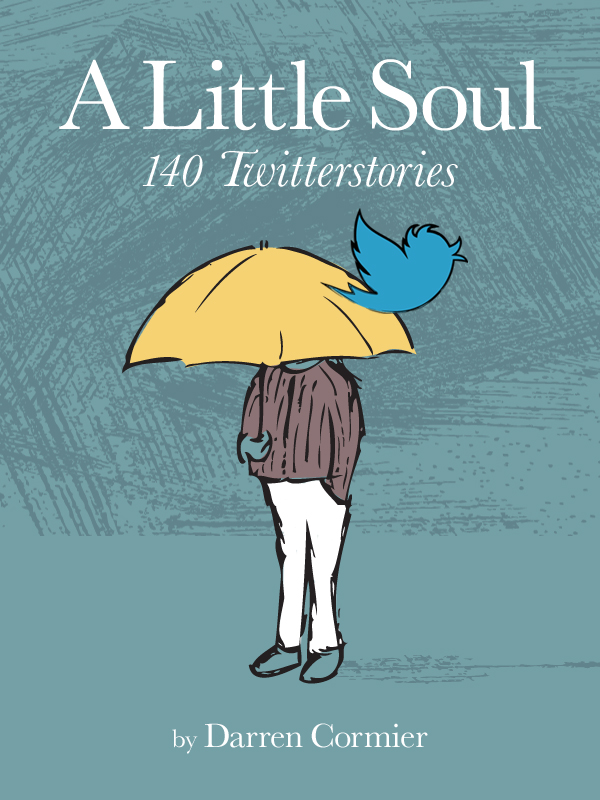 Anthony Trollope wrote seven pages a day, seven days a week. And would actually begin a new book if he came to the end of one before his day’s quota had been met. – David Markson, This is Not a Novel Mood affects everything we do, how we interact with other people, affects our productivity at work, affects how personal relationships, our energy levels. When we are in a sour mood (angry, sad, depressed, frustrated, etc.) our productivity at work suffers, we don't feel like working or interacting with other people, others' good moods will aggravate us, seeing tiny little moments of joy from others will annoy us and make us wish that person would leave. We probably don't want to create music, art, literature, cook, etc. Likewise when we are in a happy mood, when we are excited, content, we are more prone to creativity, our productivity increases, our interactions with others is more affable, tiny instances that will usually aggravate us (the copier being out of ribbon, the cat knocking over our glass of water, the next door neighbor mowing his lawn at 8p when we're trying to enjoy a book or our favorite TV show) we can shrug off. But how does mood affect writing, or any art for that matter, assuming of course that we have mustered up the courage to write in the first place, that we have been able to see past our elation and attention devouring ecstasy, past our lethargy and depression to focus on writing? One wonders if Anthony Trollope had this problem. As shown in the Markson quote above, Trollope clearly did not have a problem in garnering the motivation to write. However, what was his output like on those days he did not feel quite so creative, on those days he just didn't feel enthusiastic about the writing process, those days when he would have rather just stayed in bed with a bottle of wine and asked his servants to bring him a ham sandwich, he was not getting out of his sleeping gown? Was his output more dour, did he decide to work on stories or scenes that would reflect his mood? If he woke up in a foul mood one morning, but if in the novel he was working on at that moment he was presently working on a blissful wedding scene, would he have been able to push aside his own negativity and create the scene the novel demanded? Or did his mood alter the scene? Would he have to go back and revise what he had initially written as a crashed wedding, a blasphemous affair into something more mood appropriate? And vice versa. If one is in an elated mood, are they more capable of accessing the dark recesses of their mind, of their heart, if they are working on a murder scene or a scene of heartbreak, or emotional turmoil? Does the act of writing itself allow us to focus not on ourselves but on the work? Is the outlet enough to allow us to compartmentalize our private lives from our writing lives? Or does our personal mood affect the output of what we write? A writer friend wrote a while ago that when she is in the midst of writing an emotional scene in her book or her story that she can't help but become emotional as well, that what the characters are going through affect her. After completing the scene, she feels emotionally drained. And perhaps this is a symbiotic nature of the work itself. I haven't asked her, but I'm assuming she went into her writing that day knowing that the piece would be emotional, but that earlier she was probably in a good mood. As she began writing the events themselves began to affect her, her writing, the scene affecting her mood, her mood reflecting in her writing, scene and personal disposition mirroring each other, fiction reflecting life reflecting fiction reflecting life reflecting.... I cannot say this has happened before. In one of my stories (as yet unpublished) I wrote the scene of a young man watching the death of his mother, the two of them sharing a cigarette in the kitchen after she collapsed while they waited for the ambulance. At the risk of sounding immodest, it is a very powerful scene. However, when I was writing it, I only felt pleasure that I was able to capture an emotionally wrenching scene with such authenticity. The writing did not leave me emotional for my character; I did not feel saddened afterward, nor was my mood being reflected in the story itself. However, I did know the night before that I would need to be a bit more alert to write the scene. Once I arrived at the point of the mother's death flashback, it was 3am, and my eyes were sagging to the floor. I realized I would need to be of full alertness to properly convey the emotional intensity of the scene. But during the writing of it, I felt nothing but placidity, an unwavering equanimity. What my character was going through did not affect my mood. Or did it? Would I have been able to write so authentically as my character had I lost my job earlier in the day? Would I have been able to render the devastating power conveyed by the shared cigarette had I won the lottery earlier that afternoon? (Would I even have been writing if I had won the lottery earlier that afternoon?) It's possible that my mood of calmness was portrayed in the calm manner by which I wrote. We can never be sure. Eric Maisel wrote in his book Deep Writing about how to best access our deep feelings, how to allow ourselves to become free of our inhibitions and fears through writing about them, how writing can be a form of therapy. He wrote of how our own years-long issues can be a catalyst for our stories and be re-explored through story. At the beginning of the book he quoted a former patient who believed that a healthy sense of self and well-being was needed to create art: When I am completely healthy, completely healed, will there be more art in me? I think there will be and maybe it will be some of the best. That sense of wholeness and well-being must be a wonderful place to make art from. I hope I get a chance to be there, even if only for a while.
Many writers--at least those who have not had any form of success and keep their writing exclusively to the confines of their moleskine notebook or in reams of marked-up typewritten paper in a drawer, writing that has never seen another person's eyes except perhaps their bedraggled spouse's and even then perhaps not because the writer isn't confident enough to show it to them--have a certain nagging superstition, or a massive insecurity in their head. (Clearly, they have more than just this one forthcoming insecurity, or else they would feel free to show their work to even their spouse, but that's a different discussion and I've dragged on this topical sentence as long as I can. I have to get to the point eventually, or this threatens to become the Tristram Shandy of blog posts.)
That one superstition is that if they tell an idea to someone before they have a chance to finish it, that idea will either a) lose all potency and will not be pursued, or b) more nefariously, their idea will be stolen by someone else. Neither idea evokes much trust in humanity and the helping nature of people. These are clearly not the writers who would ever join a writer's group or even enroll in an MFA program. For that matter, they would never apply to an MFA program where their unfinished ideas have to be shared with others all the time.
I mention this because I feel I am about to violate this one major superstition. But since it is a belief I no longer have (I did at one point, years and years and years ago, in high school, and for a few brief insecure moments in undergrad where I probably trying to engender a mysterious and sensitive persona) I will share my ideas with the public, or the public I imagine that reads this blog. (all three of you.)
Some may remember that a few months back I experimented with the idea of writing an essay chronicling what goes through my head when I go running. The essay would be written in the latter-day David Markson style: pastiche, omnidirectional, collage-like, almost like an anti-novel told in Tweets or status updates, each anecdote no longer than a few lines, told in a hyperkinetic, scattershot style, much like how we imagine our brains work. The style of this essay would emulate how thoughts weave in and out of our heads when running, or even weave in and out of our thoughts when not running. I attempted a few entries like this, but each time I went running, I would think about remembering what I thought, and would attempt to recreate this when I returned home, my thoughts while running becoming meta-thoughts, the essay itself becoming meta-writing. But I lacked the discipline, and the idea of writing about running in this fashion, although the possibilities seemed infinite, ultimately proved narrow. The structure did not fit the idea.
About a month ago, I had an idea where this pastiche, Tweet-like approach could better be put to use. And yesterday, while at the Boston Book Festival, I attended a lecture titled The Novel: A Prognosis. The thesis of this panel and discussion was that the traditional novel as we know it is dead, and we live in an era where digital communication and digital media can no longer be ignored. Its effects have affected our way of thinking, our way of perception, our way of absorbing and interacting with people, places, and things. We have become the thing we did not want to become. And now we have to embrace it. And the novel, the essay, the written word has to embrace it. Nick Monfort, associate professor of digital media at MIT, said that we are not very far away from having the world's first Twitter book, a novel told entirely in tweets, 140 characters at a time. All the tweets could later be synthesized and re-jiggered into a book, but we are not that far from that time, and nor should we be.
Since I had this idea recently, I decided my idea was perfect for this challenge. And here it is. My new Markson-style, Tweetish essay on love. I am going to write an essay on the nature of love, omnidirectional, including quotes on all aspects of love, that indefinable emotion that we all have and yearn for and are embodied with and that we all find impossible to define: the nervous beginning moments, the growing comfort of, the ideas of soul mates, whether they exist, the myths, the facts, the origins, ideas taken from pop culture, songs, films, movies, heartbreak, love of humanity, forgiveness love, strength, courage it causes, infatuation, obsession, sexual, intimate, spiritual, familial, platonic, and everything else that is not covered in the above. All in 140 character spaces. It will posted both here and on my twitter page (@darrencormier), and reposted on Facebook, and any other social media outlets I may reach out to.
And there it is. My idea. Announcing to the world before I have a chance to tackle the idea. Thumbing my nose at the superstitions of other writers; thumbing my nose at the gods of insecurity. I am putting my idea into the digital maelstrom with the trust and indifference if it is stolen.
And so... there it is.
Love.
A few weeks back I noted the ending of one of my projects: the Random-Quote-of-the-Day blog and random quote of the day itself. This was due to its nature of consuming too much of my time and, like the ending of most relationships, I just didn't feel the passion anymore. Well, I am here to announce the resurrection of that project.
Now, before all two readers of this blog get upset and begin to call me a hypocrite and begin to say that I'm reneging on my word... or before they begin to genuflect in front of their keyboards and laptops to my reversal of thought and resurrection of my digital innovation and brilliance (Hey, if a man can't fantasize in an insanely self-aggrandizing fashion on his blog, where can he?), this will be a modified project.
Some certain events have recently transpired which led me to realize that a few of the quotes I had accumulated but not used, were very apropos given recent situations. I decided that instead of announcing to the world my problems and travails, it would be easier to take the higher road and also to take the more positive/cryptic road by posting motivational and inspiring quotes for myself to use. It has worked. I also realized that although I enjoyed the extra time by no longer holding myself captive to my rigid structure for finding the quotes and then photos, songs, or film clips that corresponded to the chosen quote of the day, I also missed to a certain extent quoting an inspirational or ridiculous phrase. That said, I do not want this endeavor to become a time suck.
Therefore, I announce a resurrection of the blog with a few amendments:
-- I will not be posting one every day. I may sometimes go a week without posting something.
-- I will no longer accompany each quote with a song, photo, or film clip, unless that quote comes from a song or a film and I am able to find the clip without much fuss.
That's really it for the amendments.
As always, thank you and enjoy.
<object width="560" height="304" type="application/x-shockwave-flash" data="http://movieclips.com/watch/embed/history-of-the-world-part-i-1981/the-15-commandments/" style="background: #000000; display: block; overflow: hidden;"><param name="movie" value="http://movieclips.com/watch/embed/history-of-the-world-part-i-1981/the-15-commandments/" /><param name="allowfullscreen" value="true" /><param name="bgcolor" value="#000000" /><param name="wmode" value="transparent" /><param name="allowscriptaccess" value="always" /></object><a href="http://movieclips.com/watch/history-of-the-world-part-i-1981/the-15-commandments/" style="margin: 0; padding: 1px 0 0 0; width: 560px; height: 15px; background: #000000; -moz-border-radius-bottomleft: 4px; -webkit-border-bottom-left-radius: 4px; border-bottom-left-radius: 4px; -moz-border-radius-bottomright: 4px; -webkit-border-bottom-right-radius: 4px; border-bottom-right-radius: 4px; font-family: 'Helvetica Neue', Helvetica, Arial, Sans-serif; font-weight: normal; font-size: 10px; color: #cccccc; text-decoration: none; text-align: center; line-height: normal; display: block;" onmouseover="this.style.background='#00aeff',this.style.color='#ffffff';" onmouseout="this.style.background='#000000',this.style.color='#cccccc';">Movie Videos & Movie Scenes at MOVIECLIPS.com</a>
Fans, friends, and those people who opted not to flee after stumbling across this blog (and seeing what this monkey with a typewriter has to say): It's been a few weeks since I last wrote. And, perhaps I could use the forthcoming paragraphs as a means to get me to blog more often. A few weeks back I attended the Salem Literary Festival. Among the workshops I attended was one hosted by Maine writer Jefferson Navicky on the prose poem and flash fiction. (Some of his work can be found here and here. Oh, and here, too. And a cool interview in Smokelong Quarterly, the holy grail of flash fiction magazines.) (Wow, that's a whole lot of links.) During this discussion, we were given a few writing exercises. Before a couple of the writing exercises, we practiced a technique that can be used before one sits down to write: meditation. Meditation is usually used to clear the brain, to minimize chaos, to increase general good feeling in one's self. Its therapeutic tendencies are central to Buddhism, Taoism, and many other Eastern religions. It is not usually thought of as a technique in writing. The idea of sitting in front of a computer screen or a blank piece of paper, with the intention of filling that empty space, by doing nothing, not even thinking, seems counter-intuitive. And that's precisely why it works. We all have our own personal difficulties, distractions in sitting down to write: bills, kids, spouses/significant others, basic household chores, Facebook, lack of will, etc. What motivational tactics do we use to get ourselves to write, especially on days when we just can't seem to bring ourselves to write? What tricks, techniques do you use? Do you use a reward system? Are you a naturally self-disciplined person who doesn't need any tricks? Do you need a deadline: and, if you have a self-imposed deadline, do you have the self-discipline to hold yourself to that deadline? Confession: there is a partial selfish motive in this discussion topic. Now that I've finished my MFA, I'm finding it difficult to hold myself to writing. So I'm looking for any ideas that others may have. Since graduating with my MFA, I have spent most of my creative fuel inconsistently updating this blog and trying to decide which of my many creative projects to tackle next. The usual result: too many options yielding creative paralysis. I recently had this discussion with some friends and fellow writers, and thought I would send it out to whatever readers I have of this blog. Any suggestions, or even discussion is highly welcome.As always, thanks. And enjoy.
|


 RSS Feed
RSS Feed

